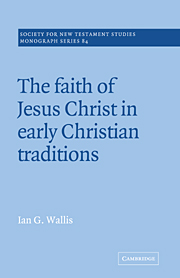Podcast: Play in new window | Download
Subscribe: Spotify | Email | RSS

During his brief ministry, did Jesus put his faith in God?
Some Christians deny that he did, including Saint Thomas Aquinas and at least one present-day evangelical apologist.
In this talk I argue that they’re mistaken; to the contrary, Jesus is presented as an exemplar of faith by multiple New Testament authors. In this, I side with some recent Roman Catholic interpreters, and with other scholars such as Ian Wallis and Teresa Morgan.
Along the way, I consider the theological and christological implications of Jesus having faith in God, focusing on responses to this argument:
1. Jesus had faith in God.
2. A fully divine being never has faith in God.
3. Therefore, Jesus was not fully divine.
Some, as you’ll hear, deny premise 1 and/or premise 2. In my view, it’s a sound argument; but here, I mostly focus on establishing premise 1.
This presentation was made possible through the support of a grant from the Templeton Religion Trust, to The Nature and Value of Faith project. The opinions expressed in it are those of the speaker and do not necessarily reflect the views of the Templeton Religion Trust.
Update: this has now been published in the International Journal for Philosophy of Religion.
Links for this episode:
- slides for this presentation
- The Nature and Value of Faith project page
- podcast 144 – Dr. Timothy Pawl’s In Defense of Conciliar Christology – Part 2
- podcast 143 – Dr. Timothy Pawl’s In Defense of Conciliar Christology – Part 1
- oligopistos
- podcast 59 – Dr. Carl Mosser on salvation as deification
- podcast 115 – the aborted council at Serdica in 343
- Stephen T. Davis
- C. Stephen Evans, ed. Exploring Kenotic Christology: The Self-Emptying of God
 Ian Wallis, The Faith of Jesus Christ in Early Christian Traditions
Ian Wallis, The Faith of Jesus Christ in Early Christian Traditions- Teresa Morgan, Roman Faith and Christian Faith: Pistis and Fides in the Early Roman Empire and Early Churches
- Texts mentioned in this episode: Luke 1:5-20; Luke 1:26-38; Luke 10:16; Hebrews 12:1-4; Hebrews 2:13; Luke 8:43-48; Matthew 27:27-44; Luke 4:16-30; Luke 5:16; Mark 14:32-42; Philippians 2; John 5:19; John 10:30; John 19:30; John 8:40; Matthew 21:18-22; Matthew 17:14-20; Matthew 8:23-27; Mark 4:35-41; Matthew 24:36; Colossians 1:18; Revelation 1:5; Acts 5:31; 2 Peter 1:4; Mark 11:15-17.
- This week’s thinking music is “Always The Teasmade Never The Tease“ by Doctor Turtle.


Good lecture, Dale. I would suggest that you should consider start working on a Christian theology book from a unitarian perspective, dealing with entire verses from Bible that have been used in favor of trinitarian perspective from a unitarian perspective and also highlighting those verses that strongly favor a unitarian perspective over trinitarian perspective. And if you could someone like Oxford publishers to publish your book, it will be a huge boost for unitarian camp among Christian theology circles. Just a suggestion 🙂
Hi Dale. In premise 2. What do you mean by “divine”? And also, how does “fully” qualify divine here?
Hi Alex. The two together mean the status essentially had by the one true God YHWH. Does that help?
Forgive my ignorance here. I have never really gotten into this debate about Trinitarianism. I am very much into the subject of deification in Christian tradition though and I really have enjoyed some of your podcasts – the ones with Carl Mosser especially and everything on Christology really. If you do anything on deification again, you should have Ben C. Blackwell and David Litwa on. Ben is pretty responsive via email, active online, and he did his dissertation on deification in Paul and the Fathers.
Anyway – to my question. Supposing for a moment that the Trinity is true, and God the Son incarnates as a human being. As God the Son, in human form, he cannot be an example of faith in God the Father? This is incoherent in some way?
Hi Alex,
I say some things in favor of premise 2 in the talk, and in the paper. But briefly:
Is God the Son, in your view, essentially omniscient? And does omniscience include everything that will ever happen, including all divine and human free actions? If so, it’s hard to see how the Son will need faith. Faith seems called for when there is some perceived risk to the faither, who is not sure what the object of faith will do, concerning something(s) that matter a lot to the faither.
Hi Dale – I really haven’t made my mind up on any of these issues. But for the sake of argument, if I was a Trinitarian, couldn’t I have a kenotic view, where God the Son lacks omniscience, divesting himself of this property in the incarnation, and avoid that conflict?
To your point about faith entailing uncertainty, risk, lack of knowledge, etc. – if a person has perfect faith, couldn’t this be construed as complete trust, or belief without doubt? Its perhaps different from the sort of faith a non-divine person might have, but we should expect that shouldn’t we? If so, then God the Son having perfect omniscience wouldn’t really be a problem either. On such a scenario, it might not be much of a personal accomplishment to have such faith but on some accounts, faith even for the average believer is a gift of God anyway.
Hi Dale, Your questions are interesting.
My own belief as a trinitarian, for what it is worth, is along the lines of the following:
The human nature of Jesus is not omniscient because this cannot be an attribute of human nature. He did not know for example everything about fig trees. So he made a “mistake” by expecting the fruit.
He also does not know the future, except it is revealed to him, in his human nature.
He knows all things in his divine nature, without getting in to the problem of his ignorance of the Father’s will, which is not a problem for me.
So he seems to have to the power to control his knowledge or to hide his divine knowledge from his human mind.
I guess this leads to other problems such as he must have known all the details of his earthly existence in his pre-existent state whether he was divine or not?
Also – what if to be “divine” means something along the lines of what Michael Heiser argues. A divine being is simply of the heavenly family, kind, or order in some sense, and one can be “fully divine” meaning of the divine class, but not necessarily the chief deity (the Father) in the hierarchy of divine beings. Jesus could be “fully divine” in that sense, and still have faith in God the Father, couldn’t he?
Interesting, one issue that might arise when dealing with multiple “fully divine” entities is who decides who’s the Boss. I mean if you have multiple fully divine entities all with the full complement of divine attributes: aseity, omnipotence,omniscience, etc.- who decides who runs the show? Do they all come to some mutual agreement? In other words, if there is some form of hierarchy amongst multiple “fully divine” entities- is that an agreed upon arrangement or are some entities “more” fully divine and others “less” fully divine- which seems kinda paradoxical.
Raymond, I think you are still smuggling a sense of ultimacy into the word “divine” here though. If we understand the word to refer to a certain class of beings, rather than a maximally great being with all of the omni-attributes at all times, I’m not sure why it should be any different than their being some humans who have power, authority, or rulership over others. They are not more or less “fully human” because of this. The divine Boss man wouldn’t be more fully divine. He would just be more authoritative, or omni-_____, and perhaps creator of the other divine beings.
Alex,
It seems to me when using the word “fully” as a modifier for different entities, the word “fully” is much more flexible when used with some ontological categories than with others.
In other words, In the human case: being “fully” human can have a vast range of instances from a unborn fetus to the most powerful Olympic athlete and everything in between- all being “fully” human.
Now when applying the modifier “fully” to the divine, it seems much more restrictive. I find it hard to imagine that “fully” divine beings exist in as much variety as their fully human counterparts, ranging from divine fetuses to divine Olympians and everything in between.
If correct, and the use of “fully” is much more restrictive when used with divinity than with humanity- then my question still remains to be answered, ” Who’s the Boss ” and “Why is that divine being the Boss rather than this divine being, who is equally divine?”
Hey Raymond – I think you’re missing my point. I’m working with OT scholar Michael Heiser’s definition of “divine” here, not the God of classical philosophy. I’m proposing that if one adopts that definition of divinity, which indeed has such a variety and hierarchy of being (including even morally reprobate gods), then I don’t think Dale’s argument really has much force. Here’s an intro to Heiser and the “divine council” worldview of the OT:
https://www.youtube.com/watch?v=povh5cYfCvs
Alex,
How can a being communicate its essential nature to others, with-out also communicating the essential attributes that make up that nature?
What you appear to be attempting to do is drive a wedge between a things nature and the attributes essential to that nature- an ontological impossibility.
In other words, according to your view, it would be possible to have an essence with no properties. However, a thing with absolutely no properties is no thing- is nothing.
I would think that these “non-human image bearers”- these lower grade “gods” are simply contingent beings with contingent (accidental) )properties. These “gods” might possess attributes similar to those of GOD, but in fact do not share in GODS essential nature, and therefore are not fully divine.
A dollar bill can be photocopied, and the copy might look remarkably similar to the genuine dollar. However, the real and fake bills are essentially different(one is truly legal tender), no matter that some might mistake the counterfeit for the real..
Comments are closed.